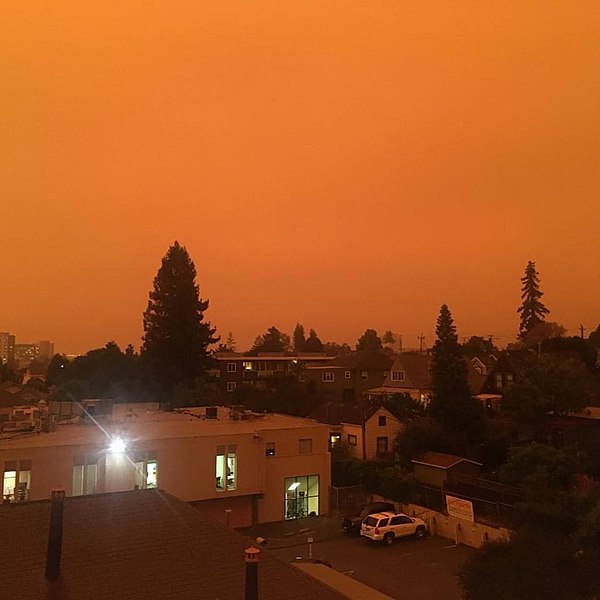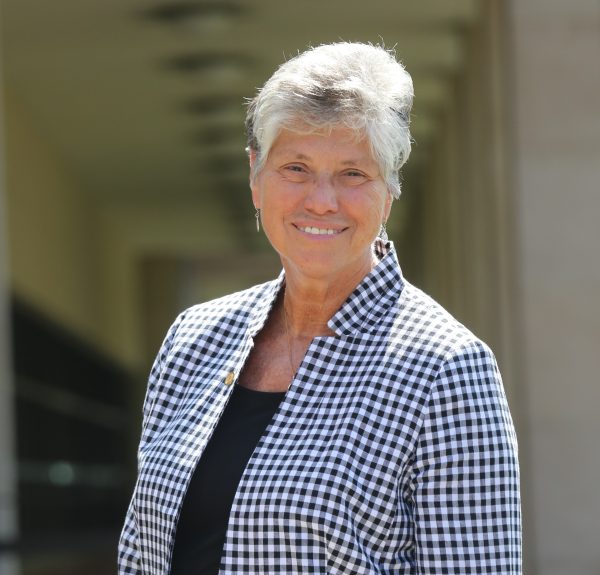OPINION: A scorching situation

The smoke from a wildfire in early Sept. 2020 paints the sky over Oakland, California. Photo via Wikimedia Commons under Creative Commons license, Courtesy of J. Healey
October 30, 2020
According to the California Department of Forestry and Fire Protection there have been 7,221 fires in California this year. These fires have led to the burning of 1,465, 048 acres of land across the state. This is troubling news.
Our government must take swift action to reduce the increased number of wildfires that climate change is facilitating. If we do not take action soon, wildfires will continue to increase and become more severe in the United States and worldwide.
One action leaders worldwide can take to decrease wildfires is acknowledging that the increase of the Earth’s temperature has been furthered by human activity. President Donald Trump specifically should recognize this fact. He has denied the scientific fact that human activity is primarily causing a global increase in temperature; and has ignored consequences of inaction on climate change such as the global increase in the number of wildfires. During a recent briefing, California Natural Resource Secretary Wade Crowfoot urged Trump to recognize how the changing climate can affect our forests, and work together with science.
Sadly, Trump simply brushed off Crowfoot’s suggestions and said “It’ll start getting cooler,” and that in his opinion, “I don’t think science knows, actually.” Which is a vague and useless statement.
Alongside this inaction on climate change, Trump also withdrew America from the Paris Climate Accords. Trump says that efforts to try and address climate change are a mistake that will hurt our economy. In a statement on the Paris Climate Accords by President Trump, he said that “The Paris Climate Accord is simply the latest example of Washington entering into an agreement that disadvantages the United States… in terms of lost jobs, lower wages, shuttered factories, and vastly diminished economic production.”
Contrary to his belief, a recent study on the economic effects of climate change led by Georgetown University found that the future cost of lack of action to prevent climate change can range from $10 to $50 trillion.
Even if world leaders do not acknowledge how humans are largely impacting climate change, we should still put pressure on large corporations that are significantly contributing to the changing climate. This pressure is already being put on large corporations such as American Petroleum Institute, the main U.S. oil and gas industry lobby group.
Many of the lawsuits directed towards the organization highlight the disproportionate impact of climate change on low-income communities and communities of color. Socially and economically disadvantaged groups face the greatest risks from climate change. Because of factors such as where the people of these communities live, language barriers, and limited access to resources.
Pressure such as this on big corporations is crucial for deterring the negative impacts humans are having on climate change, since the corporations will begin being held responsible for their actions against the environment.
One way corporations and individuals can help the climate crisis is by decreasing our carbon footprint, which is the total amount of greenhouse gases generated by our actions. Greenhouse gases trap heat in Earth’s atmosphere. Actions that increase greenhouse gas emissions into the atmosphere include using automobiles, harvesting trees, and burning coal.
This concept of a carbon footprint can be associated with individuals, products or events. We can decrease this type of footprint in a variety of ways such as relying less on oil to run our machines, or by sustainably managing our forests, so that we do not release too much carbon dioxide (CO2) into the atmosphere by cutting down trees. Trees absorb carbon dioxide already in the atmosphere, so when they are cut down, carbon dioxide is released back into the atmosphere.
At the rate we are releasing CO2 into the atmosphere, it is reaching dangerous levels. The organization Carbon Brief estimates that 2020 will most likely be the warmest or second warmest year on record. Warmer climates are the perfect locations for wildfires to start.
Some of these recent fires did not start primarily because of the warming climate. The recent El Dorado fire was caused by a smoke-generating device used during a gender reveal party. Nonetheless, the drastically warming climate in the West Coast is not helping the situation.
If we start urging world leaders to acknowledge the drastic human impact on climate change, put pressure on corporations negatively contributing to the climate crisis,relying less fossil fuels, and by sustainably collecting trees, we will help not only the serious situation on America’s West Coast, but the human driven climate crisis that is affecting our entire world. These actions will not immediately help the wildfires in the west coast and our dangerously warming climate, but it will be a small step towards helping combat climate change for the future.
Contact the writer: [email protected]














